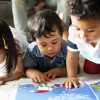Much as the White House Cabinet executes the directives of the president of the United States, the Children’s Cabinet does the same for the mayor of Baltimore but focused solely on bringing together city and state agencies and other partners to invest in Baltimore’s youngest citizens.
As part of its 2021 Action Plan—a cohesive, community-informed roadmap to address obstacles to young people’s success rooted in racism and inequity—the Children’s Cabinet commissioned the Baltimore Education Research Consortium to produce the recently published report “Baltimore City’s Young Children: Prenatal to Five Experiences.”
“This is a key group that represents Baltimore’s future,” says lead author Lieny Jeon, the Jeffrey Alexander Grigg Associate Professor at the Johns Hopkins School of Education and an expert in early childhood education. “Not enough attention is being given to their early education experiences and long-term fortunes.”
The report is more than a recounting of the litany of challenges that children in Baltimore face as they grow up, Jeon emphasized. It is also an integral part of a bold effort to begin clearing those hurdles on the way to ensuring fulfilling lives and careers for them.
There, among other recommendations, Jeon and her working group strongly support efforts to reduce chronic absenteeism in the earliest grades as well as a move to universal pre-K for all children. The much-studied initiative has been shown to greatly benefit all children but most importantly those from families with low-incomes, whose parents often find themselves caught in an unwinnable struggle between working to support their families and caring for children who are not yet in school.
The working group goes on to target specific neighborhoods where such efforts will gain the most traction, pointing out that the greatest impact will be felt in areas with higher birthrates, where many new Baltimoreans will grow up.
The report also includes a surprise recommendation or two, Jeon notes.
“Among the more critical recommendations we put forth is the need for more and better data about the early childhood experience in Baltimore—as well as systems to analyze that data,” she says. “It’s really an understudied community. And, as most researchers know, you cannot fix what you cannot measure. Our work to close gaps in the social safety net and ensure success for Baltimore’s children begins with data.”

